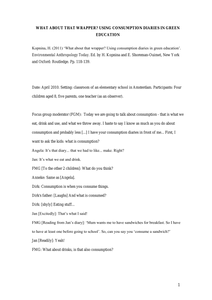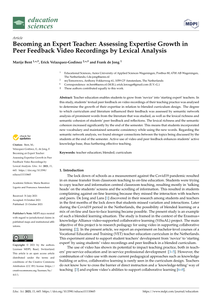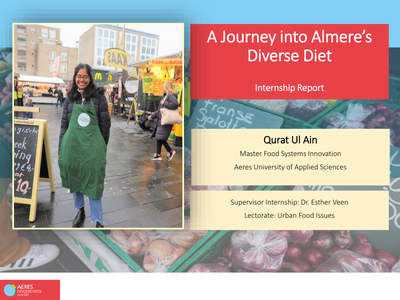Crustumerium was an Iron Age settlement north of Rome, inhabited between 850 and 500 BC. On the basis of archaeological field surveys in the 1970’s a scenario for the development of the city and its countryside was proposed, which matches traditional models of city-state formation. However, little attention was paid to the fact that the local archaeology has been substantially disturbed by nearly a century of mechanized agricultural exploitation. A new analysis of existing and new data, in which the effects of erosion are also considered, now shows that alternative interpretations, which do not assume the maximum urbanisation of the ancient settlement area, are feasible. For the rural area directly surrounding Crustumerium, new analyses of data similarly open up new avenues of interpretation. Here, recent research indicates that a major increase of rural activity (ruralisation) can be placed in the Roman period, long after the abandonment of Crustumerium. The prevailing idea based on legacy data, however, is that intensive ruralisation already took place during the reign of Crustumerium, and that the countryside fell in disuse afterwards.This new study shows that the search for pre-Roman remains in a Roman landscape is very problematic and that new angles of interpretation are needed to review the development of the city and country of Crustumerium. By doing so, the study also questions existing ideas of the urbanisation and ruralisation of ancient city-states in a broader sense.
LINK
PowerPoint presentation used at the Carbon Connects and CANAPE Final Conference on October 14, 2021 at Van Hall Larenstein University of Applied Sciences in Leeuwarden, the Netherlands.
DOCUMENT

Herontwikkelen van industrieel erfgoed vereist grondig onderzoek naar de bouw- en gebruiksgeschiedenis van dat erfgoed, en een kaart met alle waardevolle details. Anders gaat teveel verloren bij herontwikkelingen, concludeert HU-docent Kees Geevers in zijn promotieonderzoek aan de TU Delft. Hij pleit voor nieuwe richtlijnen
DOCUMENT

De workshop heeft als doel awareness te creëren rondom metadata bij iedereen die betrokken is bij projecten waarin met data gewerkt wordt. Dit betreft zowel de onderzoeker als de datasteward en onderzoeksondersteuner.
MULTIFILE

Environmental or ‘green' education is an important driving force behind the ‘greening' of society as it plays a critical role in raising environmental awareness and preparing students for green jobs. None of the existing environmental attitudes and behavior measures is focused on the evaluation of green education, especially in relation to consumption. To date, no longitudinal studies of children and students' attitudes towards consumption influenced by education exist. Also, little has been done to explore the socio-cultural context in which attitudes toward consumption are being formed and to explain the cross-cultural differences in environmental attitudes. This pilot study is designed to take the first step towards developing methods complementing existing quantitative measurements with qualitative strategies, such as consumption diaries, focus groups, and concept mapping. While this research is just a first attempt to tackle children's knowledge and attitudes consumption, preliminary results of the research on which this chapter is based and enthusiasm of the research participants encourage the author to stress the importance of consumption studies as part of green education for educational program developers. As a chapter of this volume, the author hopes that this study will add to the anthropological depository of research on the cultural variants in the perception of the environment in children. This chapter draws upon the consumption diaries collected from the upper-elementary school children in Amsterdam, The Netherlands, between September 2009 and May 2010. Consumption diaries are chronological documents recording purchase, use, and waste of materials, which can be used both as analytical tools and the means to stimulate environmental awareness. The four main methodological steps involved in this research were as follows. Children were asked to complete the consumption diary, paying specific attention to use and waste materials. Consequently, focus group meetings were held with parents and their children to discuss the diaries. Finally, interviews with the children were conducted in order to generate statements that supplement those generated by focus groups for carrying out the concept mapping analysis. The concept mapping analysis was then conducted to organize the order and analyze the ideas expressed in the focus group and interview sessions. This is an Accepted Manuscript of a book chapter published by Routledge/CRC Press in "Environmental Anthropology Today" on 8/5/11 available online: https://doi.org/10.4324/9780203806906 LinkedIn: https://www.linkedin.com/in/helenkopnina/
MULTIFILE

Teacher education enables students to grow from ‘novice’ into ‘starting expert’ teachers. In this study, students’ textual peer feedback on video recordings of their teaching practice was analysed to determine the growth of their expertise in relation to blended curriculum design. The degree to which curriculum and literature influenced their feedback was assessed by semantic network analysis of prominent words from the literature that was studied, as well as the lexical richness andsemantic cohesion of students’ peer feedback and reflections. The lexical richness and the semantic cohesion increased significantly by the end of the semester. This means that students incorporated new vocabulary and maintained semantic consistency while using the new words. Regarding the semantic network analysis, we found stronger connections between the topics being discussed by the students at the end of the semester. Active use of video and peer feedback enhances students’ activeknowledge base, thus furthering effective teaching.
DOCUMENT

Competitive advantage is probably the most popular business concept today (Mooney, 2007). This article aims to investigate critically the discourse on competitive advantage, as expressed by business literature, by locating its meanings in the public higher education sector. This research reveals that people working within the HEIs have given broader and more diversified meanings to this concept, which are partly due to the message received from external environment, and partly because of the influence of professional settings in which they function. By studying these diversified meanings, 13 elements are identified in constructing the competitive advantages of higher education institutions. Furthermore, the importance of each element is rated and ranked which enables us to assess the quantitative significance. The clarification of this container concept “competitive advantage” leads to the conclusion that the business way of defining of competitive advantage should be critically reviewed and verified in the context of public higher education sector, because the competition in the public education market is different from the normal market competition defined by the business literature.
LINK
This study explores how non-executive directors are challenged by management while they seek to improve the effectiveness of supervisory boards in the Netherlands. A combination of semi-structured interviews and a questionnaire among non-executive directors indicates that supervisory board members mainly experience boardroom challenges in three core areas: the ability of non-executive directors to ask management critical questions, information asymmetries between the management and supervisory boards and the management of the relationship between individual executive and non-executive directors. The qualitative in-depth analysis reveals the complexity of the main contributing factors to problems in the boardroom as well as the range of process and social interventions non-executive directors use to address boardroom issues. The findings highlight the need to better understand boardroom processes and the need of non-executive directors to carefully manage relationships in and around the boardroom.
LINK
The media are an integral part of how advanced societies are controlled. After almost a century of ‘broadcasting’, a new media logic can be seen to have emerged. It is not centralized, nor does it appear to depend on manipulative power (such as the priming and framing of news and thereby the agenda of political discussion; or ‘advertising’ as a way to influence consumers to buy particular products). It is the logic of ‘networking’ that is not about producers and consumers but about redaction and multipliers.1 Media content in this logic may in an archeological sense be seen as having an author or a point of origin – but the routes it takes and the way in which it spreads offers new means of community building, identity construction and meaning making which are of much greater interest. In this paper we take a double perspective (business and critical) to assess how the old and the new media logics are both relevant today and what terms are best used to work with and in the media, and to reflect on them. While producers and consumers are the senders and receivers of broadcasting in the age of the nation-state, networking logic has little use for these terms: it also moves away from marketing terms such as eyeballs and stickiness to terms such as spreadability and multiplication and redaction. The perspective of what used to be known as ‘qualitative audience research’ can prove useful to innovative and sustainable marketing and to critical reflection on media culture. Here its restyled form will be called participant design. It suggests that strong marketing respects and co-opts potential customers in much the same way that relevant media criticism is, not given from an external and possibly paternalist but from an inside perspective that highly values self-reflexivity.2
DOCUMENT

There is a strong relation between food and identity. Especially when people move to another country, traditional food (or simply food from their country of origin), symbolizes a link with culture, communityand ethnic identity. As people move around the globe they introduce new foods in the places they land. Almere is becoming one of the largest majority minority cities of the Netherlands. Walking around thecity, the diversity of food ingredients and eating cultures as shown in shops and restaurants is immediately clear. The aim of this project was to get an insight into the diets of the residents of Almere so as to learn about eating patterns in a multicultural city and how multiculturality affects the diets of both newcomers and people who have been living here for generations.
DOCUMENT
